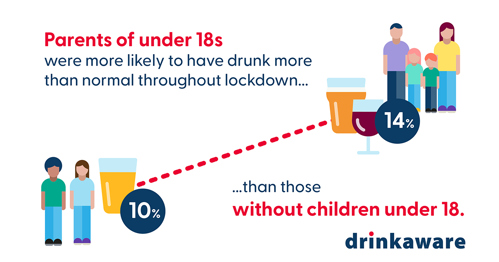By Emma Catterall, Research and Evidence Associate
The COVID-19 pandemic has brought substantial change and disruption to our lives. With the commencement of full lockdown restrictions on March 23, the nation was asked to stay at home, businesses and sectors were closed, children were home-schooled, millions of workers had to work from home for the first time, and more than one-quarter of the workforce (approximately nine million people) were furloughed at the peak of the Job Retention Scheme in May.[1]
At Drinkaware, we want to know how this substantial change to our lives has impacted the nation’s drinking behaviour. Our research conducted early in lockdown, like many others, reported a polarisation of change in drinking behaviour, with a similar proportion of drinkers (between one-fifth and one-third of the population) drinking more than normal to those drinking less than normal.[2],[3],[4],[5],[6]
While most of the population reported drinking the same or less, a significant proportion of the population reported drinking more.
As restrictions began to ease at the beginning of July, we conducted a further survey and observed signs that while some individuals may have been reverting to their normal (pre-COVID-19) drinking levels, others were reporting worrying habits, such as drinking more days a week than usual, having their first alcoholic drink earlier in the day, drinking alone, and drinking to cope.

In our latest Drinkaware Monitor, our annual state-of-the-nation capturing and understanding the nation’s drinking, we wanted to explore if changes in drinking behaviour since the end of March reverted to pre-COVID-19 levels as the summer progressed and restrictions eased, and if not, why not, and among who? We were particularly interested in change relating to work.
We asked respondents to report whether they drank more or less than normal during two stages of COVID-19 restrictions:
- The early part of lockdown (the period between March and June), when restrictions were most severe; and,
- The later part of lockdown (between July and August) when restrictions began to ease, businesses began to reopen, and the nation was encouraged to ‘eat out to help out’.
Consistent with earlier research, we found that one-quarter of drinkers (26%) reported drinking more alcohol during the early stage of lockdown (March to June). This proportion reduced to 15% during the later part of lockdown, suggesting for some drinkers, changes in consumption were potentially a temporary change following an unprecedent period, and were subsequently able to revert to their normal drinking habits.
However, one in 10 drinkers – the equivalent of 4.6 million people – drank more than normal throughout both stages of COVID-19 restrictions, suggesting the emergence of a sub-group of individuals at risk of developing a ‘new normal’ in terms of drinking habits.

Work
For many of us, one of the most prominent changes to our daily lives during the COVID-19 pandemic has been to our work—stability, security, and status.
As such, it is perhaps unsurprising that we found job uncertainty and negative mental health as major factors associated with people drinking more.

Similarly, those who had either been made redundant, or were in consultation for redundancy, were more likely to report drinking more alcohol than normal throughout both stages of COVID-19 restrictions. While the recent extension of the Job Retention Scheme until March 2021 may reduce uncertainty for some, this concern is not disappearing any time soon as new waves of restrictions are introduced and eased to reduce the spread of the virus.
Many workers also reported that their job had become more stressful, with those agreeing more likely to report drinking more throughout lockdown than those who disagreed (15% vs. 10%).

Childcare
A large proportion of society also had an additional factor to contend with—childcare.
With the unprecedented closure of childcare facilities – nurseries, schools, childminders – for all but keyworkers in the early stage of lockdown, working parents across the nation faced the added challenge of full time childcare. Our July survey highlighted parents of children under the age of 18 as more likely to report increased consumption than those without children under 18.
Our Drinkaware Monitor data indicates that for many parents, this behaviour persisted throughout both stages of COVID-19 restrictions, despite the partial reopening of some childcare facilities from June onwards (14% parents of children under 18 vs 10% of those without children under 18). It will be important to monitor if this trend continued beyond September, when schools and childcare facilities fully reopened.

Mental health and wellbeing
Our Monitor clearly shows that the COVID-19 pandemic (and associated restrictions) have had a detrimental affect on the nation’s mental health and wellbeing.
Those felt the pandemic has had an impact on their mental health and wellbeing were more likely to report drinking more alcohol than normal throughout lockdown compared to those who experienced little or no impact (14% vs. 8% respectively). This is of particular concern, as using alcohol as a coping mechanism for mental health can become a vicious cycle that can be difficult to break.
This use of alcohol during stress- and anxiety-producing times is not uncommon, but is a concern. We know individuals drink to cope, and our Monitor data indicate drinking more occurred alongside a cluster of wider health-related behaviours. Those who reported drinking more than normal throughout both stages of COVID-19 restrictions were also more likely to report eating less healthily (18%) and having gained weight (17%).
This suggests a clustering of health-related behaviours that potentially reflect the use of these coping mechanisms to manage during a time of national (and global) uncertainty. It is important that we support each other in finding a way through these unprecedented times and be mindful to the impact of COVID-19 on not only our physical, but also our mental health.
Where to from here?
We know that the most common reasons for drinking more alcohol since March include having more time available (52%), having less structure to the day (50%), to help with stress or anxiety (37%), and relieving boredom (36%). None of which are going away anytime soon.. It is important that we continue to identify those individuals who need support and attempt to reduce the stressors. While COVID-19 poses an immediate to our physical health – these secondary health behaviours may point to a future of long-term health consequences that, if not addressed, will create significant health issues down the line.
Drinkaware will be conducting a further survey of drinking behaviour in early December and will publish our results soon after.
[1] HMRC. (2020, October 22). Coronavirus Job Retention Scheme statistics: October 2020. https://www.gov.uk/government/publications/coronavirus-job-retention-scheme-statistics-october-2020/coronavirus-job-retention-scheme-statistics-october-2020.
[2] YouGov. (2020, March 24). Daily Question: Are you drinking more or less alcohol than you normally would? https://yougov.co.uk/topics/food/survey-results/daily/2020/03/24/0d9bc/3.
[3] KCL Policy Institute. (2020, April). Getting used to life under lockdown? Coronavirus in the UK. https://www.kcl.ac.uk/policy-institute/assets/coronavirus-in-the-uk.pdf.
[4] YouGov. (2020, June 10). Daily Question: Are you drinking more or less alcohol than you would have done before lockdown? https://yougov.co.uk/topics/food/survey-results/daily/2020/06/10/6b706/3.
[5] YouGov. (2020, June). YouGov/Portman Group survey on alcohol consumption during the
COVID-19 lockdown. https://www.portmangroup.org.uk/wp-content/uploads/2020/06/YouGov-Portman-Group-survey-on-alcohol-consumption-during-the-COVID-19-lockdown-2.pdf.
[6] Alcohol Change UK. (2020, July). Research: drinking in the UK during lockdown and beyond. https://alcoholchange.org.uk/blog/2020/drinking-in-the-uk-during-lockdown-and-beyond.
